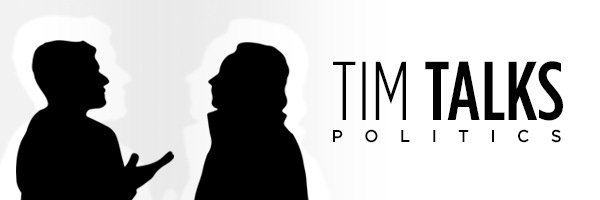Tim Talks Politics - January 5, 2018

It’s a new year and Tim Talks Politics is starting a new email newsletter!
I’m committing to bringing you this newsletter on a (mostly) weekly basis in 2018 (we all need some vacations now and again).
So, what can you expect from this endeavor? A broad overview of the past week’s political events to both inform you and broaden your frame of reference when it comes to engaging with political events.
This is NOT a news rehash or some wonky deep dive on policies (though I will give you links to those). No, this is a newsletter of thought. My goal is to give you a solid week’s worth of political knowledge from a range of perspectives. I go for thoughtful analysis and commentary rather than opinion and journalism.
So if you already get a politics newsletter that tells you what’s happening, keep it. Hopefully, this newsletter will be a great complement to the more blow by blow, news cycle-dedicated newsletters out there.
With that said,
Welcome to 2018!
What would the new year be without the 2017 post-mortems on the first year of a Trump presidency? Though the president remains as divisive a figure as ever (and dangerous according to the Politico’s Susan Glasser) Politico’s Matt Latimer argues that some things have improved, and William Inboden compliments Trump’s team at producing a National Security Strategy in the administration's first year in office (a first since 1968).
That’s not to say all is peaches and cream. Though Team Trump got some things going in the right direction on the foreign policy front in 2017 challenges remain, especially on the Korean peninsula.
A thaw in Korea?
Despite the war of words between Trump and “dear leader” Kim Jong Un, this week offered some hopeful diplomatic overtures in East Asia. Most notably, it was announced that North and South Korea are reengaging in high-level diplomatic talks this week. While the public topic is the entry of North Korean competitors into the Winter Olympics in the South, the desire to avoid war on the part of South Korea. Not only does Seoul stand to suffer tremendously in a war, but domestic politics leave very little room for risk-taking on the foreign policy front.
Interestingly, it’s not just South Korea that may be helping to draw us back from the brink. The Carnegie Endowment for International Peace notes the gap between Trump’s aggressive words and passive military action, which may indicate less of a desire for war than American journalism would suggest. According to Bradley Martin writing in the Asia Times, Western journalism needs to reassess its treatment of North Korea and include greater nuance lest the US gets pushed into a war it doesn’t need to fight.
A potential thaw on the Korean peninsula would be a foreign policy boon to the Trump administration as it must still contend with an expansionist Russia in the Middle East and the Arctic; and the still uncertain economic stability of a post-Brexit Britain and EU.
Port Erdogan
A final interesting foreign policy scenario in the last week has been Turkey’s deal with Sudan to develop/occupy a Red Sea port on the island of Suakin. The significance? The deal puts Turkey astride a critical global waterway and in competition with Egypt and Saudi Arabia for control of that waterway. I’m not sure what that all implies, but it’s certainly a big step for Turkish foreign policy in its attempt recast itself as a Mid East power.
The more things change...
Domestically, attention now turns to budget talks and regulatory reform as the White House works to hammer out a legislative agenda for 2018 with Congressional Republicans ahead of what will certainly be a rough midterm election for the GOP. After the debacle on health care and the contentious (to put it lightly) passage of tax reform, I’m sure much ink will be spilled on the ongoing dysfunction of Congress and the political parties.
Politico gets an early jump on that reportage by linking dissatisfaction with Congress to the creeping trend of workplace automation by asking “Can Washington be automated?” Sounds nice, but automation and AI don’t necessarily create better government. It’s an intriguing question, we should be careful of trading community for efficiency in politics and governance.
Final thoughts…
As you go into 2018, it’ll be easy to get overwhelmed (if you’re not already) with the daily deluge of opinion and information. Unfortunately, a lot of that will be negative and confusing. Walter Russell Mead argues for a renewed engagement with faith and moral reasoning as a guide in tumultuous times in his Yule Blog (which I highly recommend you look into).
If that more cerebral approach is too deep a dive at the moment, Quartz provides a great list of the 99 best things that happened in 2017. Politics may have seemed crazy, but Mead and Quartz remind us that 2017 was not a loss and 2018 doesn’t have to be either.
I'm looking forward to this new year and sharing this fascinating world with you!
If you know someone who would also enjoy this newsletter, please share it with them below, or sign up yourself (if you're not already).



